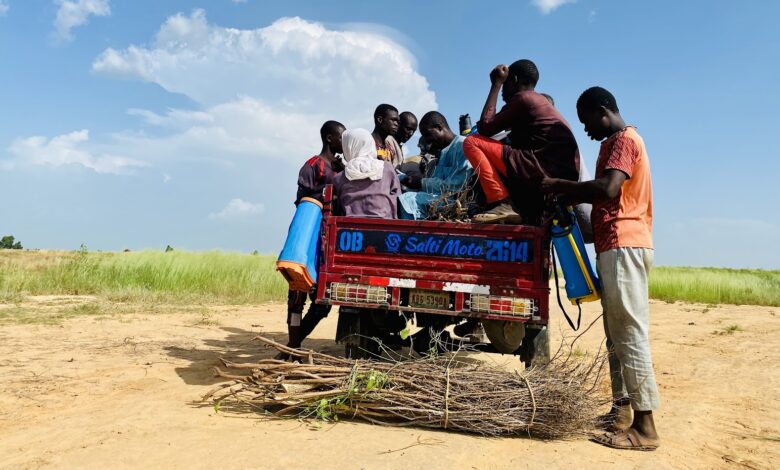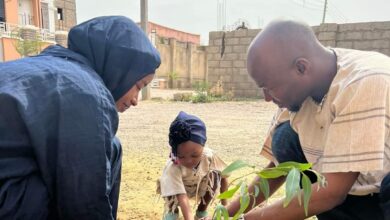In North East Nigeria, Local Farmers Lament Lack Of Access To NiMet’s Climate Predictions
The Nigerian Meteorological Agency (NiMet) offers invaluable climate forecasts, but this important information still needs to be made available to many, particularly local crop and livestock farmers.

Every year, the Nigerian Meteorological Agency (NiMet) provides the seasonal climate prediction (SCP), giving the outlook of various climatic variables such as rainfall and temperature patterns in Nigeria, and charging government authorities, stakeholders, and policymakers to take action.
The SCP, an early warning tool for planning against the effect of climate change and variability in all weather-sensitive sectors of the economy, provides vital meteorological information on temperature, rainfall patterns, and their impacts on socio-economic activities in the country.
However, in Borno and Yobe states of North East Nigeria, local farmers lack access to the SCP, leading to poor planning for the year’s farming activities.
In a farming community in the Konduga area of Borno, Modu Kura, a local farmer, lamented over the challenges he faced in recent years due to preventable disasters. In 2022, for instance, his farmland was flooded, resulting in the loss of all his crops. The following year, he experienced another setback when the shortage of rainfall led to a poor harvest.
“It is either insecurity stops you from going to the farm or the climate takes away what you planted, I am just tired,” he said.
“I don’t know what will happen this year. If I knew about these climate predictions, I would have planted early to reduce the loss,” Modu added.
Abba Gana, another farmer from the Jere Local Government Area in Borno exclaimed: “How I wish I knew what to expect before it happens, I could have made better decisions with my farms!”
Like Modu and Gana, local farmers are unaware of how changes in weather patterns, like those caused by climate change, could harm their crop yields and affect their livelihoods.
Africa needs to increase more than double the current status of agricultural production over the next 30 years to meet the growing demand for food and nutrition security, according to ScienceDirect, a scientific research institute. Meanwhile, Sub-Saharan African countries face the highest food security problem than any other region. The greatest growth in food demand will call for a considerably outperformed rate of agricultural productivity and yield increases than usual in the region.
The utilisation of digital technologies will help provide the right solutions to a few of the most burning issues of our time, including climate variability, food insecurity, malnutrition, and environmental degradation, ScienceDirect stated in a report. The research institute noted that digital technologies enhance user benefits by facilitating instantaneous information exchange, and access to new information among people.
In July 2023, farmers in Borno endured a challenging 29-day period of insufficient rainfall, prompting communities to turn to prayers in churches and mosques for relief.
Similarly, in January of the same year, NiMet forecast showed a severe dry spell that would last between 15 to 21 days or longer in June to early July in parts of the northwest (Sokoto, Zamfara, Kebbi, Jigawa, Katsina, Yobe Borno, Kano) and central states.
NiMet disseminates its findings primarily through its website and social media channels, issuing advisory measures to assist farmers in safeguarding their crops and livelihoods during the anticipated dry spell.
However, many farmers in rural areas lack access to these online platforms, yet they need valuable information provided on climate and weather to plan their operations.
Modu Abbaye, a farmer in the Geidam Local Government Area of Yobe State said he is not aware of any information about the climate due to poor network in his area. And Yusuf Mohammad, another local farmer in Yobe state, believes the information provided on NiMet is only for “people that went to school”.
“If it [weather forecasts] had been announced on the radio, I am very sure we would not have missed it,” he told HumAngle, with high hopes that NiMet could provide such information on radio platforms where they can get easy access to it.
On many occasions, NiMet has advised farmers on adaptation measures such as saving soil moisture, ensuring frequent weed control, and encouraging practices that promote soil health and crop performance that will yield crop performance. But these valuable pieces of information are not accessible to the farmers.
Radio remains the dominant news platform in Nigeria, with 77.7 per cent of Nigerians depending on it for news consumption weekly, according to the Broadcasting Board of Governors. The radio platform remains a vital part of development and farming systems.
When we contacted NiMet, James Adamu, an Agricultural Meteorologist there, told HumAngle that the agency has partnered with the United Nations Development Programme (UNDP) and also conducted several training sessions for local farmers. These farmers, in turn, were expected to pass the information to their peers in their respective dialects, Adamu said.
He also said that NiMet has collaborated with MTN Nigeria to facilitate the dissemination of weather updates to local farmers.
HumAngle shared our findings about the shortage of information to farmers in rural areas despite these efforts to NiMet, and Adamu noted that the agency would consider exploring the possibility of utilising local radio stations as a means to engage local farmers.
Agricultural education intervention programmes on radio stations would be more fruitful to increase farmers’ awareness, Muhammed Nazari, an agriculturist and researcher, told HumAngle. Jibrin Yerima, an Agriculture lecturer at the University of Maiduguri, also emphasised the necessity of employing alternative approaches to disseminate NiMet’s findings effectively to a broader spectrum of farmers.
“One of the effective methods is engaging agricultural extension services and agents in every local government area. Residents in rural areas have no access to social media, thus hindering the dissemination of information to them,” Yerima said.
“NiMet should engage agricultural extension services for broader outreach. Additionally, utilising radio would be highly effective, as people in remote communities have access to it. If NiMet embraces radio broadcasting, its objectives can also be achieved through this medium,” he added.
Support Our Journalism
There are millions of ordinary people affected by conflict in Africa whose stories are missing in the mainstream media. HumAngle is determined to tell those challenging and under-reported stories, hoping that the people impacted by these conflicts will find the safety and security they deserve.
To ensure that we continue to provide public service coverage, we have a small favour to ask you. We want you to be part of our journalistic endeavour by contributing a token to us.
Your donation will further promote a robust, free, and independent media.
Donate Here



